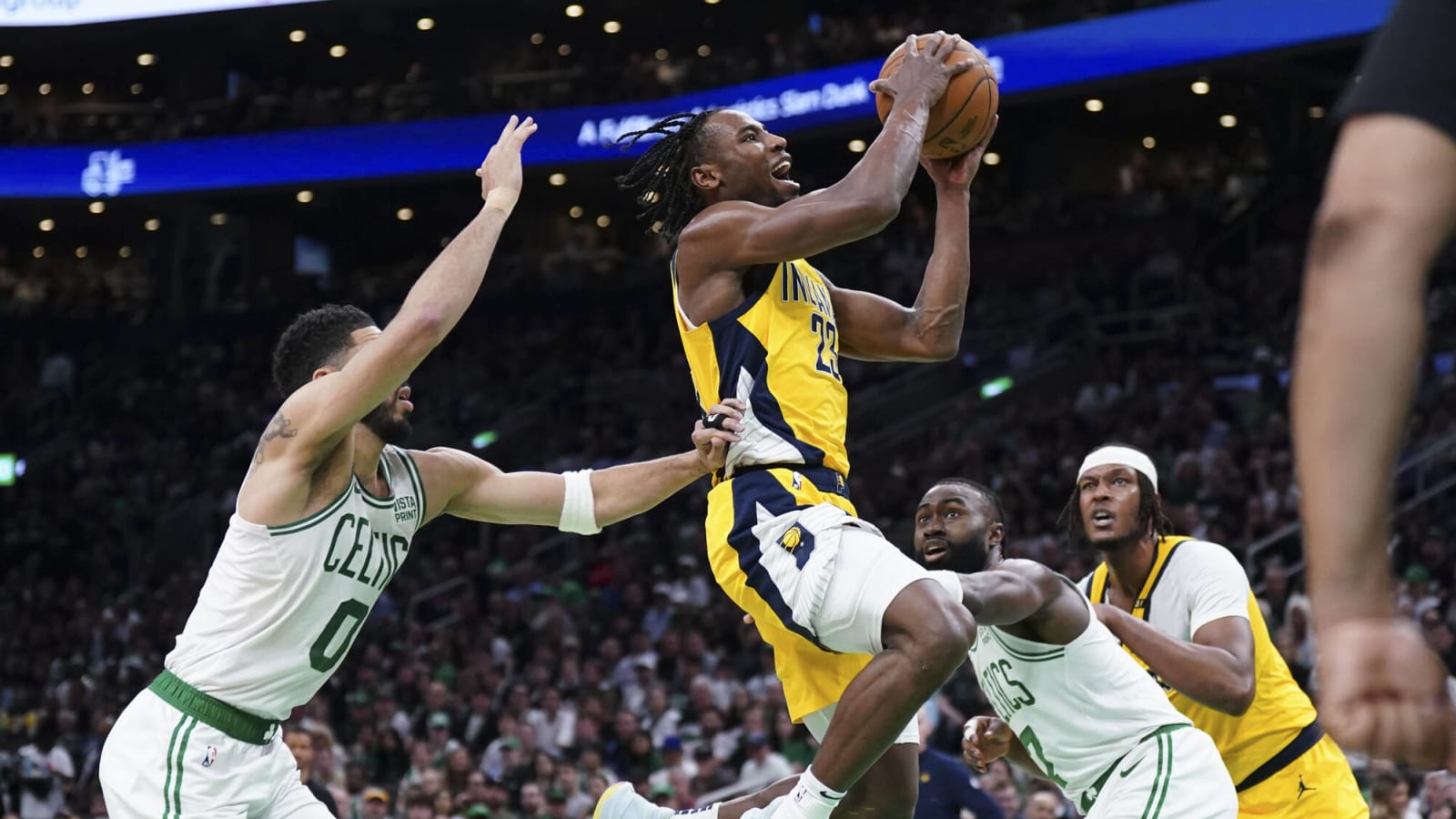
The Indiana Pacers face a tough challenge against the Boston Celtics in the Eastern Conference Finals. After a hard-fought Game 1, which the Celtics won 133-128 in overtime, it's clear the Pacers need to make some key adjustments to turn the series in their favor.
After almost stealing the game in the finals moments, the Pacers are in desperate need to come out stronger mentally for Game 2 at the TD Garden, showcasing their resilience that has led them to this point in the postseason while knocking out powerhouses in the East like the Milwaukee Bucks and New York Knicks.
1. Take Care Of The Ball
Turnovers were a major issue for the Pacers in Game 1, where they committed a staggering 22 turnovers. These mistakes directly translated into easy points for the Celtics, making it a critical area for improvement. To enhance their chances in this series, the Pacers must prioritize better ball handling and smarter decision-making on the court.
During the regular season, the Pacers managed an average of 14.1 turnovers per game, which was quite respectable. However, playoff basketball demands even greater precision and control, especially against a team as disciplined as the Celtics. Reducing turnovers will not only limit the Celtics' fast-break opportunities but also increase the Pacers' own scoring chances.
Point guard Tyrese Haliburton, who has been the team's primary playmaker, needs to lead this effort. His ability to orchestrate the offense while maintaining a low turnover rate will be crucial. Emphasizing ball security during practices and film sessions can help the Pacers develop strategies to avoid risky plays and improve their overall offensive efficiency.
Furthermore, the Pacers can benefit from simplifying their offensive sets to reduce the complexity of their plays under pressure. By focusing on fundamental plays that the team executes well, they can minimize the chances of miscues. Implementing more pick-and-roll situations, where Haliburton can use his vision to find open teammates or attack the basket, can also help in maintaining control and reducing turnovers.
2. Make The Celtics Role Players Take More Shots
The Celtics have a well-rounded roster, with stars like Jayson Tatum and Jaylen Brown leading the charge. However, one way the Pacers can strategize to limit their impact is by forcing Boston's role players to take more shots. In Game 1, Tatum scored 36 points on 12-26 shooting, and Brown added 26 points on 10-20 shooting. By applying more pressure on these two, the Pacers can make it harder for them to find clean looks, potentially frustrating them and forcing tougher shots.
If the Pacers can funnel the offense toward players like Al Horford, Jrue Holiday, and Derrick White, they can disrupt the Celtics' rhythm. Horford took 15 shots in Game 1 but only made 5, which is a shot distribution the Pacers can live with. Similarly, Holiday had a great game with 28 points on 10-16 shooting, but maintaining this strategy could see varying results over multiple games. Derrick White shot 5-13, another outcome favorable to the Pacers' defensive goals.
By forcing these role players to carry more of the offensive load, the Pacers can reduce the efficiency of Boston's attack. Increased shot attempts by role players could lead to more missed opportunities and less involvement from Tatum and Brown, potentially leading to impatience and forced shots from the Celtics' stars. This defensive strategy aims to wear down Boston's primary scorers while banking on the inconsistency of their supporting cast over a series.
3. Limit Offensive Rebounds
In Game 1, the Celtics grabbed 13 offensive rebounds, converting these into 18 second-chance points. This was a significant factor in their 133-128 overtime victory. To improve their chances in the series, the Pacers need to focus on limiting these opportunities for Boston.
Rebounding is a collective effort, and every Pacer on the floor must prioritize boxing out and securing the ball. Myles Turner, who had 10 rebounds in Game 1, needs to lead this effort, but guards and wings also need to crash the boards to help control the rebounding battle. The Celtics' ability to dominate the offensive glass disrupted Indiana's defensive flow and provided Boston with additional scoring opportunities.
Improving their defensive rebounding will not only prevent the Celtics from getting easy putbacks but also allow the Pacers to push the pace and create fast-break opportunities. By reducing Boston's second-chance points, the Pacers can disrupt their offensive flow and increase their own scoring chances.
4. Smart Decisions Down The Stretch
In the crucial moments of Game 1, the Pacers' decision-making faltered, leading to their overtime loss. Tyrese Haliburton, who had been exceptional throughout the game, made two critical turnovers in the final minutes. Pressured by Jrue Holiday, Haliburton lost the ball off his knee twice, giving the Celtics additional possessions.
One particularly costly mistake occurred when Pascal Siakam mishandled an in-bounds pass. He attempted to save the ball as it was going out of bounds, inadvertently giving possession back to the Celtics. This led to Jaylen Brown's game-tying three-pointer, sending the game into overtime.
In the final play of regulation, the Pacers failed to execute a coherent strategy. Haliburton was forced into a difficult, improvised shot due to the lack of a set play. Moreover, the Pacers missed an opportunity to foul Brown before he took his game-tying shot. With 5.4 seconds remaining and a three-point lead, a strategic foul would have sent Brown to the line, likely preventing the three-pointer and securing a Pacers victory.
These critical errors highlight the importance of maintaining composure and executing smart decisions in the final moments. The Pacers must learn from these mistakes to improve their late-game execution and avoid giving the Celtics any easy opportunities.
5. Did The Pacers Blow Their Best Chance?
The Indiana Pacers had a golden opportunity to steal Game 1 on the road at TD Garden, but critical mistakes in the final moments allowed the Celtics to escape with a 133-128 overtime win. With a chance to deliver a psychological blow to Boston and gain significant momentum, the Pacers faltered.
Leading by three points with just over five seconds left, the Pacers needed one solid defensive stand or a strategic foul to seal the victory. Instead, they allowed Jaylen Brown to hit a game-tying three-pointer, sending the game into overtime. Tyrese Haliburton's late-game turnovers and the botched inbound save by Pascal Siakam further compounded their woes.
The emotional impact of this loss cannot be understated. A win would have given the Pacers a massive confidence boost and put immense pressure on the Celtics. Now, Indiana must regroup and find a way to bounce back from this setback. The question remains whether they can recover their momentum and execute better under pressure in the upcoming games. This defeat will test the Pacers' resilience and mental toughness as they look to even the series and keep their championship hopes alive.
More must-reads:
- Kevin Durant headlining record NBA trade
- Report: Suns could make surprising move with Bradley Beal
- The 'Leading scorer by NBA franchise' quiz
Breaking News
Trending News
Customize Your Newsletter
 +
+
Get the latest news and rumors, customized to your favorite sports and teams. Emailed daily. Always free!








